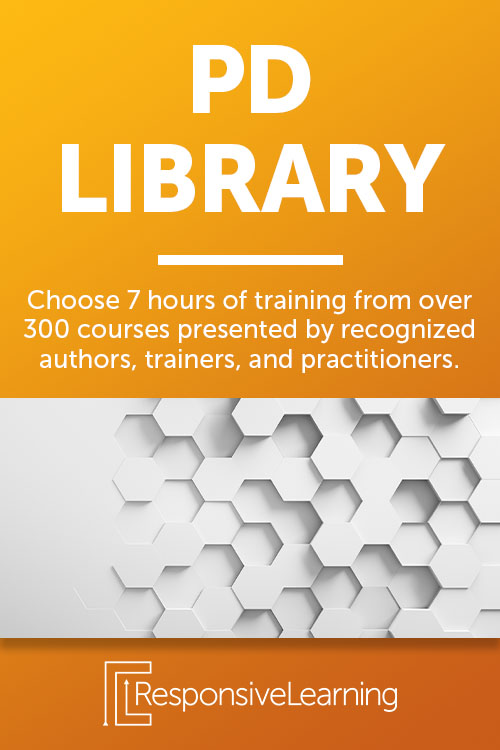The shortage of special education teachers is a decades-old problem but, these days, it seems to have reached critical levels. Districts all around the country are racing to recruit new special education teachers. Some are coming through alternative certification; others are starting in the classroom with an emergency license and without any formal training.
Supporting teachers who are brand new to the classroom is difficult, but there are some additional supports for new teachers in special education to help them be successful and return next year. Teaching is challenging, and teaching jobs in special education are next level. There are 5 essential supports for new teachers in special education that can make all the difference.
1. Stress Management
I have cried in the classroom. Not in front of students, but I’ve full-on tears-running-down-the-cheeks cried. My guess is most new special education teachers have. It’s a stressful job. And if your teachers are working with students who have complex access needs or low-incidence disabilities, like autism, intellectual disabilities, or Down syndrome, then you can bet the stress is that much more intense.
New teachers need tips on reducing mental health pressures. In fact, all teachers need techniques to manage stress as an educator. We all know the tried-and-true tips of breathing, asking for help, and working smarter, not harder. As an administrator, we’re always looking forward to teacher staffing and retention as well as performance. In order to retain trained teachers and boost overall performance, consider what your campus can do to reduce stress and burnout.
One of the main ways to reduce SpEd teacher stress is to make sure they get breaks and planning periods. Supporting students with complex access needs may mean doing more to meet the physical, medical, and safety needs of students. I’ve known teachers who never took a full duty-free lunch or complete conference period because they were always monitoring a student in the classroom or feeding a student or helping with transferring a student in and out of their wheelchair. Now, with severe staff shortages, sometimes those breaks are just not possible to safely support students.
But here’s the thing: they need that break. What else can you do to manage stress and reduce teacher burnout on your campus? Check out this blog for helpful tips on How to Manage Stress and Reduce Teacher Burnout.
2. Meaningful Mentoring
What are the benefits of mentoring for teachers? It helps them grow and improve, feel encouraged, and get guidance on teaching and behavior management. It also helps a teacher feel connected and supported, which boosts self-confidence and enhances retention.
Set up a mentor system where a teacher has someone outside of their team to be a building buddy and show them the ropes, like how to get to the front of the line on Nacho Day in the cafeteria. On top of that, provide a mentor that can show a teacher the paperwork, processes, and procedures related to all things special education. This may fall to a department chair or team leader. Whoever it is, make sure you have one.
Here’s the problem though: On your campus, the teacher that supports students with the most complex access needs may be the only one. There is no team, no content or programming equal to provide mentorship. You may not have chairs or team leads to offer this support. Then what?
I suggest partnering with other campuses in your district to set up virtual mentorship. With all the practice everyone has had on video conferencing tools and digital meetings, it’s not a stretch. In this situation, at least your teachers can connect with someone just like them and get tips that are meaningful for their situation.
3. Substantive Support
When a teacher starts their first year, it’s all about survival. Making it through to the end in one piece is the endgame. But, what do they need to get there?
First, they need regular check-ins with you, a mentor, or an instructional coach, just to make sure things are going okay. Second, they absolutely need a system to tap out, which entails getting coverage for a few minutes so a teacher can catch their breath, calm down, or refocus.
And finally, they need you to listen. The teachers on your campus have very specific needs. Ask what those are with a survey. It may be your SpEd teachers need more training, want paraprofessionals to have more training, need specific instructional tools, or just help figuring out how to destress as a team. The only way you’ll know how to help best is to ask and listen.
4. Instruction on Interventions
What does it take to be a great special education teacher? Well, it takes a ton of knowledge. There is just so much to know in terms of working with students with disabilities, academic differentiation, and the incorporation of functional skills, as well as managing behaviors. Pile on paperwork, data and progress monitoring, and lesson planning, and, well, it starts to be a lot.
Here’s the thing… a teacher needs to know the strategies, interventions, and mechanisms to support a student with complex access needs in the classroom. That means practical sound training that is not about theory but is about real-world tips they can apply today.
As an administrator or campus leader, you have to acknowledge that these teachers can’t just get supported once or twice a year on materials that are specific to their students. They need knowledge, and they needed it yesterday. Finding an easy-to-access, completely practical, and effective way to build capacity is critical. You’ll need a way to help teachers learn the skills they may lack.
First, plan to cover instruction to allow teachers to attend professional development specific to their situation. Attending professional development training is one of the main and most impactful ways to increase a teacher’s knowledge base. Just be sure the training is practical for your teacher’s situation.
Second, pay for teachers to take online training that can cover instructional interventions, behavior management, and more at as-you-go pacing. After all, not all teachers can be made available to attend in-person training. Virtual training can get the information to teachers in a meaningful way that is also flexible.
Finally, promote collaboration between teachers who work in the same setting on different campuses to build an alliance that shares information. Teachers need knowledge to be successful. Figure out how to get them what they need.
5. Positivity & Praise
Working in special education is an extremely rewarding and fulfilling job, but it comes with some baggage too. Teachers new to special ed may feel unsuccessful or ineffective at different points throughout the year, or even throughout the day. Finding ways to show appreciation and praise the positive things you see in and out of the classroom can help boost teacher morale. That boost has a positive impact on their team and their students.
It can be simple things that don’t cost a dime. Try a jeans pass. Cover the teacher’s class for them to take a 30-minute bonus break. Give them a special award outside their door to recognize them in some way. Being ‘Teacher of the Week” can make anyone’s week better. If you have the budget for it, consider t-shirts, flair pens, a special breakfast or a catered lunch, and even a substitute for a day! That sub can give your teacher time to catch up on paperwork, do lesson plans, or even take a couple of quick online PD classes.
The takeaway here is that positivity, praise, and acknowledgment matter for new special education teachers and that impacts overall program quality. Determine how you can sprinkle positivity throughout your team because everyone loves a little love.
How to Support New Teachers in Special Education
Supporting special education teachers can be done in five easy ways:
1). Help to manage stress. 2). Implement meaningful mentorships. 3). Provide some support that matters to the teacher. 4). Provide professional development. 5). Sprinkle on that positive praise. When we take the time to do these things, it impacts our teacher productivity, team cohesion, staff efficacy, and student success.

About the Author: Ayo Jones is an experienced special education teacher, successful instructional coach, and charismatic professional speaker. Driven by her love for all things special education, Ayo provides educators teaching students with significant disabilities exactly what they need to survive and thrive. In her over 15 years in education, she has coached hundreds of teachers, trained thousands of educational professionals, and developed curriculum for tens of thousands of students with disabilities. You can learn more about Ayo on her website, Noodle Nook.

